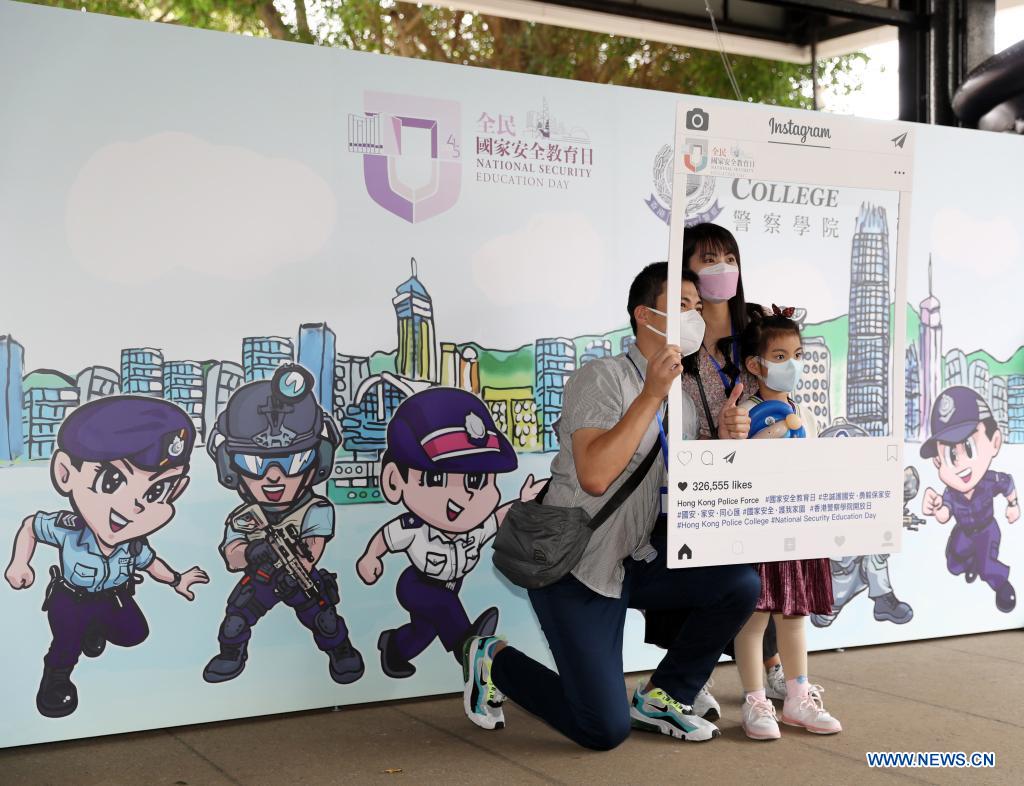Hong Kong embraces 1st national security education day after related law takes effect in 2020
Hong Kong embraced its first National Security Education Day on Thursday after the law on safeguarding national security in the Hong Kong Special Administrative Region (HKSAR) came into force in mid-2020.
Hong Kong embraced its first National Security Education Day on Thursday after the law on safeguarding national security in the Hong Kong Special Administrative Region (HKSAR) came into force in mid-2020.
Citizens pose for a photo during an activity themed on National Security Education Day at the Hong Kong Police College in south China's Hong Kong, on April 15, 2021. Hong Kong on Thursday embraced its first National Security Education Day after the law on safeguarding national security in the Hong Kong Special Administrative Region (HKSAR) came into force in mid-2020. Various activities, including lectures, exhibitions, mosaic walls and doors open days of disciplined services, were held to boost the public awareness of safeguarding national security in the global financial hub. (Xinhua/Li Gang)
WIDE PARTICIPATION
Various activities, including lectures, exhibitions, mosaic walls and Open Days of disciplined services, were held to raise public awareness of safeguarding national security.
The events, under the theme "Uphold National Security, Safeguard Our Home -- Improve Electoral System, Ensure Patriots Administering Hong Kong," were organized by the Committee for Safeguarding National Security of the HKSAR, which was established by the HKSAR government in July 2020.
Five institutes of disciplined services - the Hong Kong Police Force, the Fire Services, the Correctional Services, the Customs and Excise, and the Immigration - were open to the public on Thursday. In the Hong Kong Police College, officers performed Chinese-style marching and held anti-terrorism drills.
From Statue Square and Sha Tin Town Hall, people participated in forming a giant pattern of "Together We Safeguard Our Nation & Homeland" on mosaic walls.
Educational activities also took place on campuses. At the HKFEW Wong Cho Bau Secondary School, students hoisted national flags, sang the national anthem, read display boards about national security, and joined online contests.
"National security education will help children form correct values and national identity," Chim Hon-ming, the principal of Chiu Sheung School, Hong Kong, said.
PEACE RESTORED
Looking back at the past year, it has been a consensus in Hong Kong that the national security law opened a new chapter for the global financial hub.
When Hong Kong was faced with unprecedented crises, the central authorities made resolute responses and passed the law on safeguarding national security in the HKSAR, which effectively restored stability in Hong Kong and helped the Hong Kong society get out of the shadow of violence, Chief Executive of the HKSAR Carrie Lam said Thursday.
So Wing-on, president of Cross-Strait Peaceful Development Federation, still clearly remembered the social unrest in 2019.
"People who dared to say they love the country were very likely to be assaulted (by rioters) ... and those messing up with Hong Kong did whatever they wanted," he said. "At that time, we eagerly anticipated the country would take action to bring Hong Kong back to normal."
While Hong Kong has regained stability, So said national security education for the public is of particular significance.
Yim Wai-ning, executive director of the Hong Kong Federation of Overseas Chinese Associations, said fact has proved the significance of the national security law to Hong Kong's prosperity and stability.
Only when national security is safeguarded, will the implementation of "one country, two systems" continue, the well-being of Hong Kong compatriots be ensured, and the long-term peace and stability of Hong Kong be truly realized, Yim said.
According to a survey conducted by local think-tank Bauhinia Institute, 85.7% of respondents agree that Hong Kong has the constitutional responsibility to safeguard national security and 78.6% of residents believe the Hong Kong society has become more peaceful since the national security law took effect.
MORE EFFORTS NEEDED
While Hong Kong has returned to peace and order, continued efforts should be made to safeguard national security and ensure Hong Kong's success will be sustainable.
Luo Huining, director of the Liaison Office of the Central People's Government in the HKSAR, said the central authorities will remain committed to the responsibility of safeguarding national security and will, as always, lend full support to the HKSAR for its lawful crackdown on criminal activities endangering national security.
He urged the HKSAR to earnestly discharge its constitutional obligation for safeguarding national security and asked all Hong Kong compatriots to fulfill their legal obligations of safeguarding national security.
Although the society has largely resumed normalcy, Secretary for Security of the HKSAR government John Lee said it does not mean the national security risk has disappeared.
Hong Kong should keep its guard up in case there is a resurgence of "Hong Kong independence," local terrorism and external interference, among others, Lee said.
Commissioner of Police of the HKSAR government Chris Tang said no matter who conducts activities endangering national security, the police will bring the offender to justice.


